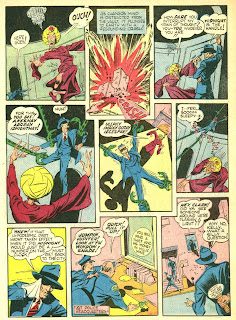In his third appearance, (Smash Comics #20) Midnight advances from fighting street criminals and corrupt officials, to squaring-off against an opponent with actual superpowers.
Chango the Magician became embittered after the death of vaudeville resulted in the corollary mortification of his career. He seeks payback from the 'ungrateful' public by using magic to vivify items of wealth, and call them to himself.
When Dave Clark--along with many other denizens of Big City--spots valuables fleeing their owners, the fearless radio announcer decides to hitch a ride on a runaway trunk! It carries Clark to Chango's hideout, an abandoned mine. When he attempts to subdue the villain, Clark is caught in midair and transmuted into tobacco smoke through the power of mystic Pig Latin. (Who knew that harnessing dark forces was so simple?)
When Dave Clark--along with many other denizens of Big City--spots valuables fleeing their owners, the fearless radio announcer decides to hitch a ride on a runaway trunk! It carries Clark to Chango's hideout, an abandoned mine. When he attempts to subdue the villain, Clark is caught in midair and transmuted into tobacco smoke through the power of mystic Pig Latin. (Who knew that harnessing dark forces was so simple?)
One might be forgiven for assuming that the involuntary adoption of a gaseous state would pretty well spell the end of a person. However, in keeping with the double-fortune that always seems to follow Golden Age heroes, not only does Chango's power apparently have an effective radius, Smoke-Clark just happens to cross that barrier when he's directly above a lake. Transforming back into his true self, Clark takes an invigorating (if impromptu) swim. As he emerges from the lake, Clark cannot remember how he got here (another side effect of Chango's enchantment) and concludes he must've fallen asleep fishing. Upon returning to Big City, however, Clark is questioned by a man who witnessed his earlier ride-off on the magic trunk. This, coupled with smelling the cigar smoke from a passerby, is enough to jog his memory. Clark changes into his Midnight garb and speeds back toward the mine.
Meanwhile, Chango has made good on an earlier threat to steal the federal treasury vault from Knoxville (TN?). Thanks to the mystic trance required to transport the vault, Midnight is able to approach Chango undetected. Yet for some reason our intrepid hero botches this advantage. Rather than sneak up to the sorcerer and knock him unconscious, Midnight hurls a hypodermic dart from across the room, simultaneously: breaking Chango's concentration, alerting him to Midnight's presence, and sending the reserve vault plummeting to earth.
Side note 1: This is another great example of the bizarre items produced seemingly out of nowhere by an otherwise normal dude who just happens to occasionally put on a domino mask to beat up bad guys. Oh well, I guess no one ever accused Golden Age kids' comics of belonging in the Norton's Anthology of great Western literature.
Unsurprisingly, this enrages the magician, who promptly conjures up serpents and charges them with pulling Midnight apart. And it's just about time for another deus ex machina. This time, we learn that Midnight's dart had been laced with a sedative that now takes effect, knocking the villain unconscious before the snakes can finish their grisly task. (Presumably, after their creator loses consciousness, the snakes simply dissolve into nothingness.)
With the villain thus restrained, Clark returns to Big City and surreptitiously passes information to the police indicating both the thief and the stolen goods can be located at Mills' Mine. (No word on the fallout of a federal building collapsing in the hinterlands.)
With the villain thus restrained, Clark returns to Big City and surreptitiously passes information to the police indicating both the thief and the stolen goods can be located at Mills' Mine. (No word on the fallout of a federal building collapsing in the hinterlands.)
Side note 2: This issue features two very rare panels. Typically, Jack Cole's characters are either asking questions or shouting. A quick perusal of these early Midnight stories will demonstrate that most dialogue ends in at least one (and often two) exclamation points!! However, for reasons that are not readily obvious (at least not to me) there are two panels in this story where Midnights speaks in simple dispassionate declaratory sentences.








No comments:
Post a Comment